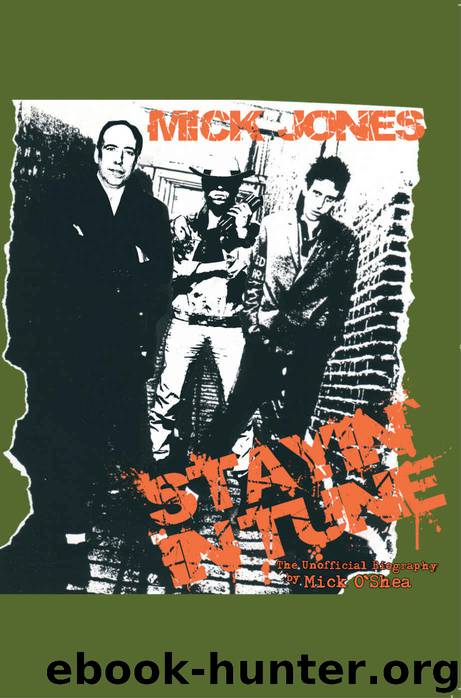Mick Jones: Stayin' In Tune - The Unauthorised Biography by Mick O'Shea

Author:Mick O'Shea [O'Shea, Mick]
Language: eng
Format: epub
Publisher: Eleusinian Press
Published: 2016-11-26T23:00:00+00:00
Being a jobbing musician, Ivan understood how tension can quickly build up when the dollars are disappearing with each tick of the clock, but he was struck by Mick's domineering personality. 'There weren't any rows as such, [but] Mick would push people when it was sometimes uncalled for,' he revealed. 'There'd be a time when the guys would feel like breaking out, and Mick would be insisting we carry on. It was like, "Come on, what's your problem?"'9
Ivan might not have witnessed any serious disputes between Mick and Joe, but by the time The Clash reconvened at Wessex in midAugust following the Sixteen Tons European dates cracks were beginning to appear in the group's creative partnership. Evidence that Joe was feeling the strain came at the opening European date in Hamburg with his smashing a young German skinhead about the head with his Telecaster in retaliation for the skinhead using the lad in front of him as a human punch-bag. Joe was lucky to escape serious charges, but instead of taking a much-needed break he agreed to assist Mick with the song-writing on Spirit Of St Louis, the second album by Mick's Epic label mate and new girlfriend Ellen Foley* (Seven of the songs making up the final track-listing are credited as Strummer-Jones compositions). All four members of The Clash would make guest appearances on the album, and Mick would also take over the production chair at Wessex where Ellen recorded the album.
It was whilst The Clash were recording in New York that Mick first became hip to the new music that was buzzing around the Big Apple. Although Joe and Paul were happy to borrow a little of what was going down with the kids in Harlem and the South Bronx on songs such as 'The Magnificent Seven', Mick embraced rap with a passion, as he later revealed to Paulo Hewitt: 'Ever since I hit that New York club for the first time, I thought, "God, beatbox", that was it for me. I knew I was still a guitar player and I stuck that on top of it.'10
'C'mon Every Beatbox' was still several years hence, yet while Mick saw the endless possibilities available to The Clash if he could only persuade Joe and Paul to give up rioting in favour of dancing, he has always maintained that he didn't view the group's experimentation with rap as particularly ground-breaking. 'We never thought that, at any time,' he subsequently revealed to Kris Needs. 'We were just sort of knocking out some numbers. It's like that's all we wanted to do; to do our thing. We didn't necessarily wanna be part of this big, happening thing that was so cool. We just did what we wanted to do. I guess it's because we had that kind of attitude.'11
Download
This site does not store any files on its server. We only index and link to content provided by other sites. Please contact the content providers to delete copyright contents if any and email us, we'll remove relevant links or contents immediately.
Cecilia; Or, Memoirs of an Heiress — Volume 2 by Fanny Burney(31933)
Cecilia; Or, Memoirs of an Heiress — Volume 3 by Fanny Burney(31925)
Fanny Burney by Claire Harman(26591)
We're Going to Need More Wine by Gabrielle Union(19028)
Plagued by Fire by Paul Hendrickson(17398)
All the Missing Girls by Megan Miranda(15920)
Cat's cradle by Kurt Vonnegut(15322)
Bombshells: Glamour Girls of a Lifetime by Sullivan Steve(14046)
For the Love of Europe by Rick Steves(13848)
Leonardo da Vinci by Walter Isaacson(13303)
4 3 2 1: A Novel by Paul Auster(12362)
The remains of the day by Kazuo Ishiguro(8964)
Adultolescence by Gabbie Hanna(8908)
Note to Self by Connor Franta(7663)
Diary of a Player by Brad Paisley(7544)
Giovanni's Room by James Baldwin(7315)
What Does This Button Do? by Bruce Dickinson(6194)
Ego Is the Enemy by Ryan Holiday(5406)
Born a Crime by Trevor Noah(5367)
